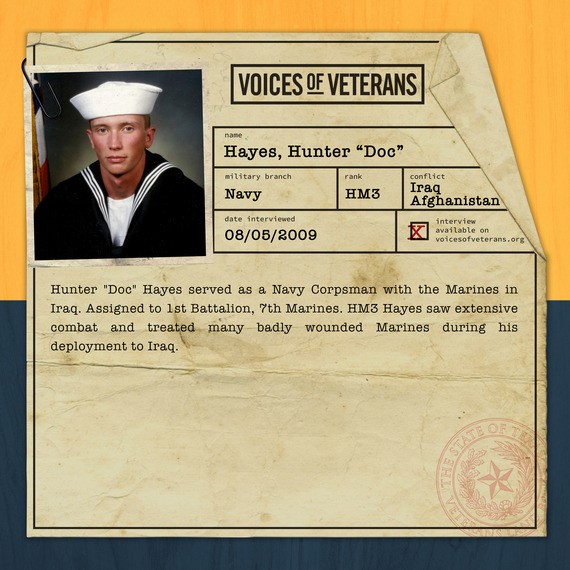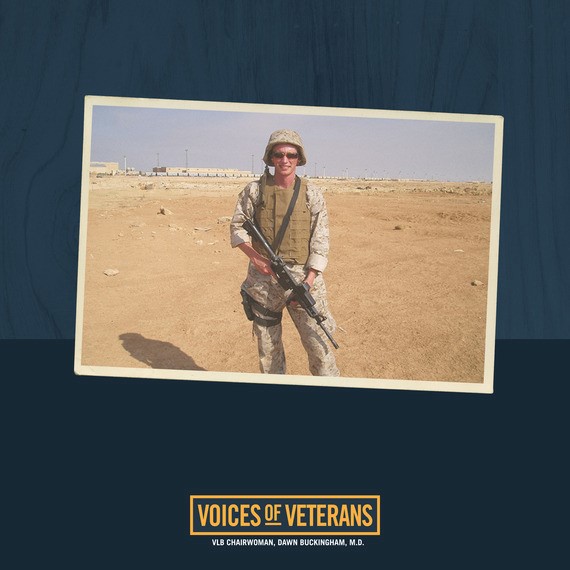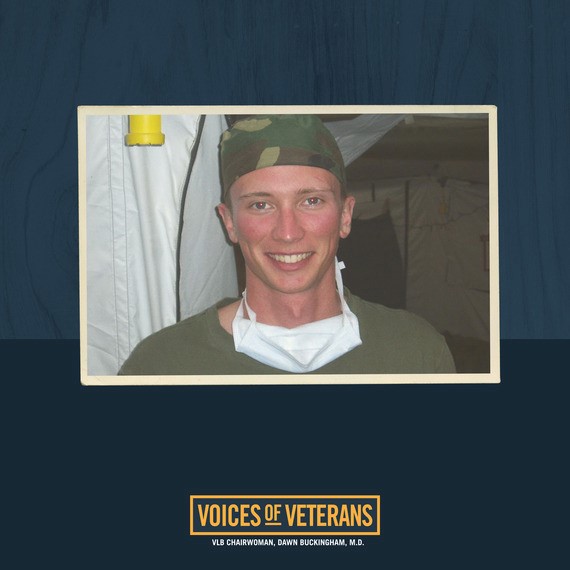Voices of Veterans: HM3 Hunter "Doc" Hayes Shares His Story of Service in the U.S. Navy
AUSTIN — Today, Texas Land Commissioner and Veterans Land Board (VLB) Chairwoman Dawn Buckingham, M.D., is proud to introduce the next installment of the series highlighting the VLB's Voices of Veterans oral history program. This week, we highlight the service of HM3 Hunter "Doc" Hayes who served with the U.S. Marines as a U.S. Navy Corpsman in Iraq and Afghanistan.
Hayes said he spent much of his younger years growing up in Lufkin, Texas and while he wasn't born there, it's where he considers himself to be from, even though he spent some of his adolescence across the pond.
"I went to a school in Ireland for half of my 10th grade year and 11th grade year," Hayes said. "My dad and uncle owned some businesses over in Ireland and I was fortunate enough to travel with them and experience school in another country."
Hayes decision to join the military was made in the summer of 2001, just a few short months before the harrowing images of tragedy splashed across television screens and America was thrust into war.

"I was in boot camp when 9/11 happened. And I always heard, you know, in boot camp they try to mess with you, you know what I mean," he explained of that fateful day in New York, The Pentagon and Pennsylvania. "When they came in and told us, I was like 'oh, they’re just messing with us, it’s not true' and then about a week later, we have our medical appointments and dental appointments and I saw it on the TV, I was like oh my God, it’s real."
Hayes said, when it came to his service, he didn't want to be sitting behind a desk and he wanted to be in the thick of it and in the dirt, so to speak, and chose the Navy with the ultimate goal of becoming a doctor.
"My grandfather was in the Navy during World War II, and it’s just an attractive service because there’s so many things that you can do in the Navy. You can be on the ground, you can be on a boat, you can be on a sub, you can fly, I mean it’s just, it’s really the best service," he said about his choice.
Hayes said he won't forget his first time working in an ER setting, before he deployed to Kuwait. He said he was sent to a Naval trauma training center at LA County, and that’s really where he got to learn about trauma at LA County Hospital in East LA.
"It was like a war zone," Haye said about LA County Hospital. "I mean gun shot wounds, just significant trauma. I mean if it weren’t for that, I mean that really prepared me."
He recalled vividly the first time he assisted in a trauma there, something he's never forgotten all these years and combat missions later.

"It was a Jane Doe, nobody knew her name, but she was in a car accident. I guess her wallet maybe flew out of the car or something like that, and I wheeled her in, and we got her in the little bay area, and there’s doctors everywhere. They do what’s called a clamshell, and open her chest, and they shoot adrenaline into it, pump her heart, all that kind of stuff, and I’m bagging her and breathing for her," he explained. "It was just insane. And they took her to the OR, but I mean she eventually died. I’ll never forget the time, 1:52 a.m."
Hayes said, overall, he spent about three years training, finally getting a chance to deploy in July 2004. He said they had a small stopover in Germany where they used the phone, smoked some cigarettes and left for Kuwait for only two hours or so before they left again, this time for Iraq. Hayes said when he was in Iraq he wasn't assigned to a particular squad or platoon, instead he was assigned to stay next to the Battalion Aid Station.
"There was nobody else that could do my job," he said about not being assigned to a platoon. "There was nobody that had the training that I had in the Naval trauma training center, and my OIC was like, I begged every single time because I wanted to go out with 3/7 because they had been there and done that stuff and I was like, I was hard charging to be able to go."
Hayes said he grew close to the guys in his group while in Iraq and that he could talk about anything with them. He said he remembers like yesterday the first suicide bomber he encountered and how that moment, much like Jane Doe at LA County, has never left him.

"It was October 17th, and it was like our first suicide bomber, and me and one of the surgeons, Dr. Nelson, we were putting a guy in a cooler because he was killed and he didn’t have any legs and it was just, I have never in my life seen a body that was more charred and chewed up than this guy, and here you are holding him, trying to, pulling him off the truck and everything, and it smells like frickin’ barbecued chicken," he said about that day. "I still today can’t eat barbecued chicken because of it, and it was just, I’ll never forget that. I remember just walking around going 'oh my God, what is going on?'"
Hayes said his medical unit came to the realization, together, they needed to talk out what they were seeing and feeling. Recognizing, he said, they would need to live with this for the rest of their lives, it made them accept it and deal with it. While it wasn't always easy, he said they also talked about the heroism their duty brought as well.
"We got accredited for saving 25 Marines, but I mean it’s gratifying, you know what I mean, but a lot of the times it’s like we saved ‘em because we had to amputate something or something like that," Hayes said. "It’s always tough to say that, to say hey, we had to cut your legs off -- and this was in the field, mind you, this wasn’t in a hospital. This is in a frickin’ tent with a little giggly saw that we would, it’s pretty barbaric, but you got to do what you got to do to save life over limb."
To listen to HM3 Hunter "Doc" Hayes tell his story, click the button below:
Hayes said his medical unit came to the realization, together, they needed to talk out what they were seeing and feeling. Recognizing, he said, they would need to live with this for the rest of their lives, it made them accept it and deal with it. While it wasn't always easy, he said they also talked about the heroism their duty brought as well.
"We got accredited for saving 25 Marines, but I mean it’s gratifying, you know what I mean, but a lot of the times it’s like we saved ‘em because we had to amputate something or something like that," Hayes said. "It’s always tough to say that, to say hey, we had to cut your legs off -- and this was in the field, mind you, this wasn’t in a hospital. This is in a frickin’ tent with a little giggly saw that we would, it’s pretty barbaric, but you got to do what you got to do to save life over limb."
Veterans can email VoicesofVeterans@glo.texas.gov to tell their stories. Please note that the Veteran must be a resident of Texas at the time of their interview.
Voices of Veterans is a state agency's first Veteran oral history program. It records the stories of Texas Veterans through their time in service and after returning home from combat.
The VLB records interviews with veterans over the phone or in person. Their interviews are then permanently archived in the Office of Veterans Records at the GLO, where they join the historical documents of other Texas heroes such as Sam Houston, Davy Crockett, Jim Bowie, and William Barret Travis.
Veterans' interviews are also available to researchers, historians, genealogists, and the public. These precious records inspire future generations and remind us of our Veterans' sacrifices.
To listen to the over 500 archived stories of Veterans documented through the GLO's Voices of Veterans oral history program, click the button below:
More Press Releases
